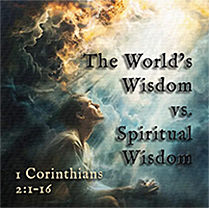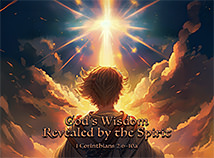First Corinthians 2:6–16 . . .
The World’s Wisdom vs. The Wisdom of the Spirit
First Corinthians expresses Paul’s heart for a disunited church to become unified (1:10). Thus far, Paul has humbled everyone including himself: He’s said to the Corinthians, Your message is foolish (1:18–25); you yourselves are foolish (1:26–31); and I am foolish (2:1–5). Outside of that, everyone and everything is just fine. Now in 2:6–16, Paul states that the only way the Corinthians — and all of us — can live a wise life is by having the right perspective and appropriate power. He’ll argue that without the light of God’s Spirit, we’ll remain in the dark. He begins by addressing two key aspects of his teaching: (1) the right perspective (vv. 6–9) demonstrating the necessity of spiritual discernment through the Holy Spirit to grasp God’s wisdom and (2) the call to moral purity (vv. 10–16) as evidence of a life transformed by faith in Christ.…
1) True wisdom is cross-centered (vv. 6–9, shown at the bottom of this page). In order to be truly wise and consistently exercise a wise perspective, we must have a proper view of wisdom. Throughout this overarching section (1:18–2:5), Paul has declared that wisdom is found in the word of the cross.
Thus, in vv. 6–8, the word “wisdom” (sophia in Greek) is repeated five times in the first three verses. The apostles (and those of us who boldly tell others our personal story of faith) speak the message of the cross to those who are “mature,” those believers who recognize and embrace God’s wisdom in the cross. Since Paul doesn’t divulge who among them is “mature,” readers must decide for themselves whether they qualify or not. This same principle applies to us today. Are you a mature Christian? If so, how have you arrived at that conclusion? Paul argues that we’re only mature if we have the right perspective on “the cross.”
Additionally, in four verses Paul highlights three aspects of God’s wisdom: The wisdom of God is eternal (v. 6), beneficial (v. 7), and supernatural (v. 8–9).
[Note: Paul has told us in the first four verses that the right perspective is to recognize that true wisdom is cross-centered. He now goes on to share with us the true power source.]
2) True wisdom is Spirit-directed (vv. 10–16). Paul states that it’s the Holy Spirit who reveals deep things to Christians. Therefore, if we want to grow to maturity in Christ, we must rely upon the Holy Spirit’s power and abilities. As a believer, please answer each of these three questions: (1) Are you dependent upon the Holy Spirit in your Bible study? (2) In your prayer life, do you ask the Holy Spirit to reveal to you God’s wisdom so you can pray effectively? (3) In your marriage and family, do you pray: Holy Spirit, fill me so that I can be who you want me to become?
In reality, the natural world can’t figure us out; we’re an enigma. They can’t understand why someone would volunteer for children’s ministry or youth ministry, year after year, or donate 10 percent of his or her income for to help promote and advance the Lord’s work. They can’t appreciate why someone would want to tell them their personal story about the essential role that Jesus plays continually in their life.
Our lifestyle appears strange to the people of this world. We hold convictions that other people don’t, each based on a different set of absolutes. We’ll be kind and compassionate to people when others will be cruel; we’ll also be intolerant when others become intolerant. It’s all because we have insight into the mind of God.
Paul closes v. 16 (in the NASB version) with these dramatic words: “For who has known the mind of the Lord, that he will instruct Him? But we have the mind of Christ.” Therein, Paul quotes Isaiah 40:13, reminding us that we can’t know the mind of God apart from appreciating the Holy Spirit’s active indwelling in us.
Note: 1st Corinthians challenges believers to examine every aspect of their lives through the lens of the Gospel. In chapters 1–4, Paul presents these four challenges:
Christ is God’s wisdom (ch. 1) | Spiritual wisdom (ch. 2)
The church and its leaders (ch. 3) | True apostleship (ch. 4)
› Watch BibleProject’s superb animated video (1 min.) that highlights Paul’s messages in these first four chapters.
† Summary of 1 Corinthians 2:6–16
• God’s Wisdom Revealed by the Spirit (vv. 6–10a)
Herein, Paul emphasizes that God’s wisdom is distinct from human wisdom; it’s revealed only through the Holy Spirit. This divine wisdom, centered on Jesus Christ and his crucifixion, is inaccessible to human reasoning or the rulers of this age. Instead, it’s a hidden wisdom, prepared by God for those who love him. Paul asserts that this wisdom cannot be understood by worldly means but is revealed to believers through the Spirit, who searches the deep things of God and makes them known to those who are spiritually receptive. He quotes Isaiah, emphasizing that no human mind could conceive what God has prepared for those who love him.
• The Spirit’s Role in Understanding (vv. 10b–13)
Apostle Paul highlights that no one can comprehend God’s thoughts except the Spirit of God. Believers have received this Spirit, enabling them to understand the gifts freely given by God. Paul contrasts spiritual wisdom with human wisdom, stating that his teaching is guided by the Spirit and expressed in spiritual truths.
• The Natural vs. Spiritual Person (vv. 14–16)
The apostle next distinguishes between the “natural person,” who cannot accept spiritual truths because he or she is discerned only through the Spirit, and the “spiritual person,” who judges things and has the mind of Christ. The spiritual person is guided by God’s wisdom and isn’t subject to judgment by those who lack the indwelt Spirit.
† Key Themes of this Passage
1) God’s Hidden Wisdom: True wisdom comes from God and is revealed through his Spirit, not through human intellect or worldly understanding.
2) The Holy Spirit’s Role: The Spirit enables believers to understand divine truths and hopefully appreciate God’s plans.
3) Spiritual Discernment: Only those having the Spirit in them can grasp spiritual realities, because they’ve been given “the mind of Christ.”
Note: This passage emphasizes reliance on the Holy Spirit to better understand God’s wisdom. It also contrasts worldly thinking with spiritual insight available to believers.
- Q. 1 To whom do you turn when you need wisdom? Your spouse? A parent? Your pastor? A friend? Or __________?
- Q. 2 What does God mean by “secret” or “mysterious” or “unseen” wisdom (vv. 7, 9)? Who was Apollos (See Acts 18:24–28)?
- Q. 3 How do you feel about v. 9? How is your outlook on life affected by the promises in this verse?
1 Corinthians 2:6–16
New American Standard Bible (NASB)
[You can view it in a different version by clicking here; you can also listen to this chapter.]
God’s Wisdom Revealed by the Spirit
6Yet we do speak wisdom among those who are mature; a wisdom, however, not of this age nor of the rulers of this age, who are passing away; 7but we speak God’s wisdom in a mystery, the hidden wisdom which God predestined before the ages to our glory; 8the wisdom which none of the rulers of this age has understood; for if they had understood it they would not have crucified the Lord of glory; 9but just as it is written,
“Things which eye has not seen and ear has not heard,
And which have not entered the heart of man,
All that God has prepared for those who love him.”
10For to us God revealed them through the Spirit; for the Spirit searches all things, even the depths of God. 11For who among men knows the thoughts of a man except the spirit of the man which is in him? Even so the thoughts of God no one knows except the Spirit of God. 12Now we have received, not the spirit of the world, but the Spirit who is from God, so that we may know the things freely given to us by God, 13which things we also speak, not in words taught by human wisdom, but in those taught by the Spirit, combining spiritual thoughts with spiritual words.
14But a natural man does not accept the things of the Spirit of God, for they are foolishness to him; and he cannot understand them, because they are spiritually appraised. 15But he who is spiritual appraises all things, yet he himself is appraised by no one. 16For who has known the mind of the Lord, that he will instruct him? But we have the mind of Christ.



